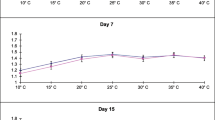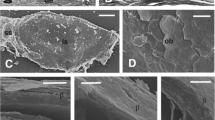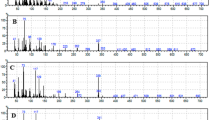Abstract
LOEWI, DALE, FELDBERG and their co-workers have emphasised the importance and physiological activity of acetylcholine in vertebrates1. The possibility of extending to invertebrates the cholinergic mechanisms described in mammals has, so far, not been tested experimentally. The first point investigated at Naples was the existence of unstable choline esters in tissue extracts of marine invertebrates.
This is a preview of subscription content, access via your institution
Access options
Subscribe to this journal
Receive 51 print issues and online access
$199.00 per year
only $3.90 per issue
Buy this article
- Purchase on Springer Link
- Instant access to full article PDF
Prices may be subject to local taxes which are calculated during checkout
Similar content being viewed by others
References
Dale, H. H., ” Nothnagels Vorlesung”, Urban and Schwarzenberg, Vienna, 1935.
Chang, H. C., and Gaddum, J. H., J. Physiol., 79, 255; 1933.
Author information
Authors and Affiliations
Rights and permissions
About this article
Cite this article
BACQ, Z. Occurrence of Unstable Choline Esters in Invertebrates. Nature 136, 30–31 (1935). https://doi.org/10.1038/136030c0
Issue Date:
DOI: https://doi.org/10.1038/136030c0
Comments
By submitting a comment you agree to abide by our Terms and Community Guidelines. If you find something abusive or that does not comply with our terms or guidelines please flag it as inappropriate.



